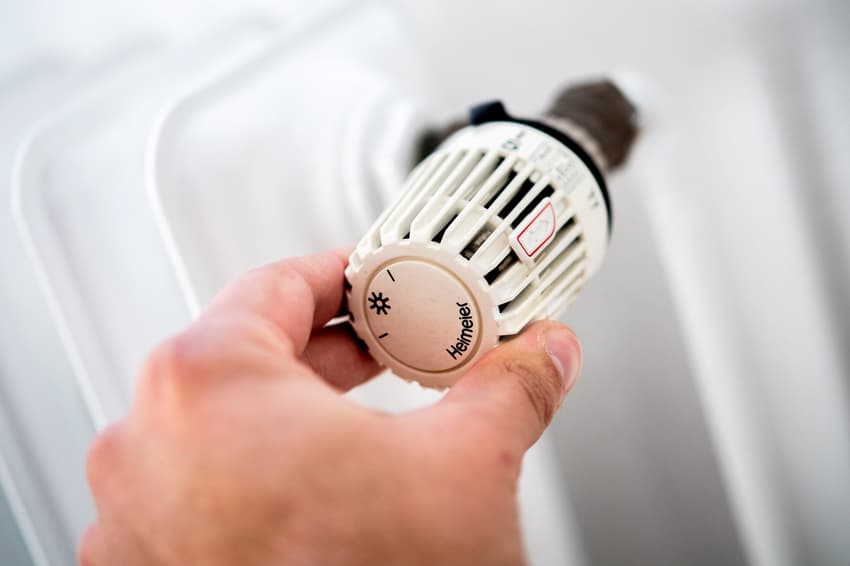EXPLAINED: How high will heating bills be this winter in Germany?

The cost of energy is expected to rise again this coming winter, even though the government's price cap is supposed to be in effect until April 2024. Here's what households can expect.
The onset of winter will raise concerns for many in Germany about the cost of heating their homes, with memories of last year's rocketing prices and concerns over domestic gas supply resurfacing.
But, compared to last year, the energy prices have now largely stabilised, though they are still higher than in 2021.
The stabilisation in prices is partly thanks to the government's energy price cap which came into force earlier this year to cushion the blow of soaring energy prices by capping electricity costs at 40 cents per kilowatt-hour and natural gas at 12 cents.
READ ALSO: Germany looks to extend energy price cap until April 2024
The federal government plans to maintain this cap until the end of April, though this could be extended even longer, if necessary.
How high are heating costs expected to go this year?
For the current year, experts from co2online expect somewhat lower heating costs than last year.
Heating with gas, for example, is expected to be 11 percent cheaper in 2023 than in 2022, costing €1,310 per year for a flat of 70 square metres.
The cost of heating with wood pellets will drop by 17 percent to €870 per year, and heating with heating oil will cost 19 percent less and amount to €1,130.
According to co2online, the costs for heating with a heat pump will drop the most - by 20 percent to €1,1105. The reason for this, according to co2online, is a wider range of heat pump electricity tariffs.
Tax hikes in January
Starting January next year, the government will raise the value-added tax on natural gas from seven to nineteen percent.
Alongside this, the CO2 price, applicable when refuelling and heating, will also increase.
According to energy expert Thomas Engelke from the Federal Consumer Association, these increases will mean that a small single-family household with three or four people that heats with gas would then pay about €240 more per year for gas.
"That's a lot", he said.
Comments
See Also
The onset of winter will raise concerns for many in Germany about the cost of heating their homes, with memories of last year's rocketing prices and concerns over domestic gas supply resurfacing.
But, compared to last year, the energy prices have now largely stabilised, though they are still higher than in 2021.
The stabilisation in prices is partly thanks to the government's energy price cap which came into force earlier this year to cushion the blow of soaring energy prices by capping electricity costs at 40 cents per kilowatt-hour and natural gas at 12 cents.
READ ALSO: Germany looks to extend energy price cap until April 2024
The federal government plans to maintain this cap until the end of April, though this could be extended even longer, if necessary.
How high are heating costs expected to go this year?
For the current year, experts from co2online expect somewhat lower heating costs than last year.
Heating with gas, for example, is expected to be 11 percent cheaper in 2023 than in 2022, costing €1,310 per year for a flat of 70 square metres.
The cost of heating with wood pellets will drop by 17 percent to €870 per year, and heating with heating oil will cost 19 percent less and amount to €1,130.
According to co2online, the costs for heating with a heat pump will drop the most - by 20 percent to €1,1105. The reason for this, according to co2online, is a wider range of heat pump electricity tariffs.
Tax hikes in January
Starting January next year, the government will raise the value-added tax on natural gas from seven to nineteen percent.
Alongside this, the CO2 price, applicable when refuelling and heating, will also increase.
According to energy expert Thomas Engelke from the Federal Consumer Association, these increases will mean that a small single-family household with three or four people that heats with gas would then pay about €240 more per year for gas.
"That's a lot", he said.
Join the conversation in our comments section below. Share your own views and experience and if you have a question or suggestion for our journalists then email us at [email protected].
Please keep comments civil, constructive and on topic – and make sure to read our terms of use before getting involved.
Please log in here to leave a comment.